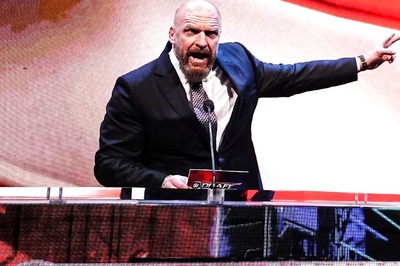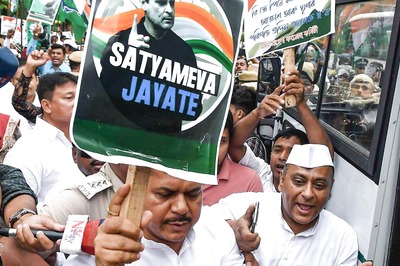
views
Years have been kind to Dil Chahta Hai and it still remains one of the most revisited, comfort films of Hindi cinema. Interestingly, the song album, which is now revered across generations of listeners and for the first time incorporated different elements of world music, received a lukewarm response from labels at the time of release. Composers Shankar-Ehsaan-Loy revisit their ‘best work’ which also marked the trio’s arrival in the industry and share why the songs have grown on people.
First thoughts on Dil Chahta Hai turning 20.
Shankar Mahadevan: We remember everything so distinctly as if it was just yesterday that we composed all this music, the kind of energy we put together and had such a great time. It is amazing how fast time flies and still how fresh this film is.
Ehsaan Noorani: Whenever we perform the music it sounds so new. It’s like twenty years have passed and still no time has passed. We are still there. It was very new for the time and it still is. There has not been a film like DCH since then. There has been no soundtrack like that since. Having composed the music ourselves, we have never been able to live up to that level.
Loy Mendonsa: Sometimes filmmakers come and ask us for a track that is very different and new. But when you give them that, a lot of times the way it is picturised is still the traditional way. In DCH, everything they did was so fresh. A whole new take on our music. That made a huge difference.
What place does DCH album hold in your careers in the film industry?
Ehsaan: It was like a launching pad for us. We had done Mission Kashmir, Shool and Dillagi before this but nobody could put a face on us. When the DCH album came out, it made such a huge difference in the terms of the style of music. People had never heard anything like this before. I am very proud to say that we are part of Indian film industry’s history having single handedly changed the music scene out here by introducing new sounds. This album gave us a face. People knew who we were. It launched us into the thick of the industry.
Shankar: When we came out with the album, initially, the response was very lukewarm. Many of the music companies who were used to hearing a particular type of sound said ‘oh, this does not sound like film music!’ But that is why we were brought in so that it does not sound like something you have heard before. Anything fresh and pathbreaking is met with resistance at first. That happened with DCH music as well. Like slow poison it grew on people’s minds and our songs are still playing. The music has gone into the audience’s system.
What makes the DCH soundtrack timeless?
Loy: Whoever is watching the film or listening to the songs, it is a bit of a flashback for them. It triggers some memories with your buddies. The crazy things that you used to do. Some of you may still be in touch or some may have gone to other parts of the world. When you look back on those portions of your life, you’d love to relive them. The music is one way of looking back, putting on your headphones and going into that zone. Synchronicity has a ring to it.
Ehsaan: The album had nothing that was familiar in terms of what was popular then. In the late ’90s, AR Rahman had just come out. Others who were popular then were Jatin-Lalit, Nadeem-Shravan and Anand-Milind and there was a particular kind of music that they did. DCH came through and it was so different. It was rock guitar for the first time. There’s techno music in Koi Kahe Kehta Rahe, Jaane Kyun Log makes way for African music in between, there is ambient music in Kaisi Hai Yeh Rut and also Celtic music, which has been introduced in Woh Ladki Hai Kahan. It took time for people to adjust but when they got used to it, it was like an addiction. It still is.
You have been working with DCH director Farhan Akhtar and the family ever since. How did the collaboration begin?
Ehsaan: Javed saab suggested to Farhan to contact us and see if things work out. He had heard some of our music. We met and found ourselves on the same wavelength musically. He was into rock, blues, classical and world music and anything he wanted, we could do it together. The vibe was correct back then and has continued right through till Toofaan. The whole family has a crazy sense of humour. Plus, Javed saab has a way of putting deep thoughts into the simplest of words. To start a song with a word like ‘tanhayee’ (loneliness), you have already shot the arrow into the person’s heart. It gives you the gist of the song. Who has shot a song for a guy standing in a graveyard feeling his solitude? It is almost poetic. It requires depth in the person to have imagined and shot it that way.
Loy: Javed saab and Shankar have a great sync. A lot of the times the rhythmic references are very different but Javed saab will write literally to the cut. There are very rare instances working with him that you have to modify anything. When you hear Tanhayee and watch that section, you can feel the pain. It is amazing how it has all these movements and stillness simultaneously.
On selecting singers for DCH songs
Shankar: Every singer has something they bring to the table. When you’re writing songs, some names keep flashing in front of your eyes. It is exactly like casting actors in a role. If you listen to Woh Ladki Hai Kahan, Shaan’s voice fits so perfectly, it feels like Saif (Ali Khan) himself is singing. Their talking voices are also very similar.
Ehsaan: Udit’s (Narayan) voice was synonymous with Aamir Khan’s voice since Papa Kehte Hain and through till Lagaan. Even Aamir suggested it would be good to look at Udit for his song (Jaane Kyun Log). Sonu (Nigam) for Tanhayee was a very different choice though. His was more of a love song kind of a voice. But the way he delivered Tanhayee, it came as really the right pick. It is not an easy song to sing. You probably need some classical training to be able to sing a song like this which has so much modulation. When Sonu got awards for Tanhayee, he thanked us for giving him the most articulate song in the album. It is one of the most difficult songs to sing. He just captured the emotion perfectly and sang it beautifully. Then Srinivas was a very good choice for Kaise Hai Yeh Rut. A South Indian, he has got that slight tinge in his voice. It is probably one of the most different songs he has ever sung. The song itself is very different in its structure. When he sang it, he was blown away.
Do you have any favourites in DCH album?
A resounding ‘No’ from Shankar-Ehsaan-Loy.
Read all the Latest News, Breaking News and Coronavirus News here.


















Comments
0 comment